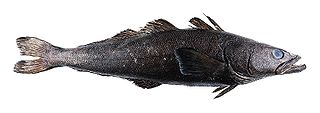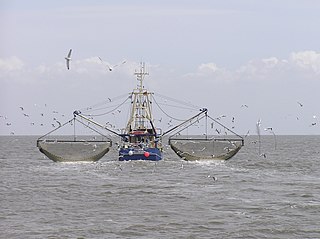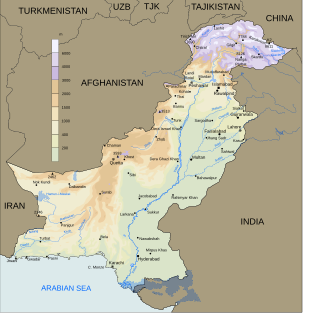The economy of the Falkland Islands, which first involved sealing, whaling and provisioning ships, became heavily dependent on sheep farming from the 1870s to 1980. It then diversified and now has income from tourism, commercial fishing, and servicing the fishing industry as well as agriculture. The Falkland Islands use the Falkland pound, which is backed by the British pound.
The Cod Wars were a series of 20th-century confrontations between the United Kingdom and Iceland about fishing rights in the North Atlantic. Each of the disputes ended with an Icelandic victory.

The Patagonian toothfish, also known as Chilean sea bass, mero, icefish, and Antarctic cod, is a species of notothen found in cold waters between depths of 45 and 3,850 m in the southern Atlantic, Pacific, and Indian Oceans and Southern Ocean on seamounts and continental shelves around most Subantarctic islands.

A fishing vessel is a boat or ship used to catch fish and other valuable nektonic aquatic animals in the sea, lake or river. Humans have used different kinds of surface vessels in commercial, artisanal and recreational fishing.

A factory ship, also known as a fish processing vessel, is a large ocean-going vessel with extensive on-board facilities for processing and freezing caught fish or whales. Modern factory ships are automated and enlarged versions of the earlier whalers, and their use for fishing has grown dramatically. Some factory ships are equipped to serve as a mother ship.

Vessel Monitoring Systems (VMS) is a general term to describe systems that are used in commercial fishing to allow environmental and fisheries regulatory organizations to track and monitor the activities of fishing vessels. They are a key part of monitoring control and surveillance (MCS) programs at national and international levels. VMS may be used to monitor vessels in the territorial waters of a country or a subdivision of a country, or in the Exclusive Economic Zones (EEZ) that extend 200 nautical miles (370.4 km) from the coasts of many countries. VMS systems are used to improve the management and sustainability of the marine environment, through ensuring proper fishing practices and the prevention of illegal fishing, and thus protect and enhance the livelihoods of fishermen.
This page is a list of fishing topics.

Fishing is a major economic activity in Portugal. The country has a long tradition in the sector, and is among the countries in the world with the highest fish consumption per capita. Roman ruins of fish processing facilities were found across the Portuguese coast. Fish has been an important staple for the entire Portuguese population, at least since the Portuguese Age of Discovery.

As with other countries, New Zealand's 200 nautical miles exclusive economic zone gives its fishing industry special fishing rights. It covers 4.1 million square kilometres. This is the sixth largest zone in the world, and is fourteen times the land area of New Zealand.

China has one-fifth of the world's population and accounts for one-third of the world's reported fish production as well as two-thirds of the world's reported aquaculture production. It is also a major importer of seafood and the country's seafood market is estimated to grow to a market size worth US$53.5 Billion by 2027.

As with other countries, the 200 nautical miles (370 km) exclusive economic zone (EEZ) off the coast of the United States gives its fishing industry special fishing rights. It covers 11.4 million square kilometres, which is the second largest zone in the world, exceeding the land area of the United States.

The fishing industry plays a significant part in the national economy of Pakistan. With a coastline of about 1,120 km, Pakistan has enough fishery resources that remain to be developed. Most of the population of the coastal areas of Sindh and Balochistan depends on fisheries for livelihood. It is also a major source of export earning.

The fishing industry in Brunei is one of the largest contributors of the country's revenue. Fishing is a major source of protein in the diets of the Brunei people. The coastal location on the island of Borneo makes it an ideal location for commercial and subsistence fishing.
HMS Cordella was a Royal Navy auxiliary mine countermeasures vessel that served during the Falklands War as part of 11th MCM Squadron.

The graytail skate, or gray tail skate, is a large species of skate in the family Arhynchobatidae, native to the south-western Atlantic Ocean and south-eastern Pacific Ocean. It is listed as endangered by the IUCN. It was caught as part of a commercial fishery around the Falkland Islands and is a bycatch in several other fisheries.

Fishing is important to the national economy of Vanuatu. It is the main source of income for many in the islands and Vanuatu's biggest export. According to 2009 figures, approximately 77% of households in Vanuatu are involved in fishing activity. According to 2005 figures, Vanuatu caught 151,080 fish in that year, with frozen fish accounted for half of Vanuatu's commodity exports.

The fishing industry in Denmark operates around the coastline, from western Jutland to Bornholm. While the overall contribution of the fisheries sector to the country's economy is only about 0.5 percent, Denmark is ranked fifth in the world in exports of fish and fish products. Approximately 20,000 Danish people are employed in fishing, aquaculture, and related industries.

Doryteuthis gahi, also known as the Patagonian longfin squid and Patagonian squid, is a small-sized squid belonging to the family Loliginidae. It occurs in coastal waters in the southeastern Pacific Ocean and the southwestern Atlantic Ocean where it is caught and eaten for food.
The fishing industry in Thailand, in accordance with usage by The World Bank, the UN's Food and Agriculture Organization (FAO) and other multinational bodies, refers to and encompasses recreational fishing, aquaculture, and wild fisheries both onshore and offshore.















